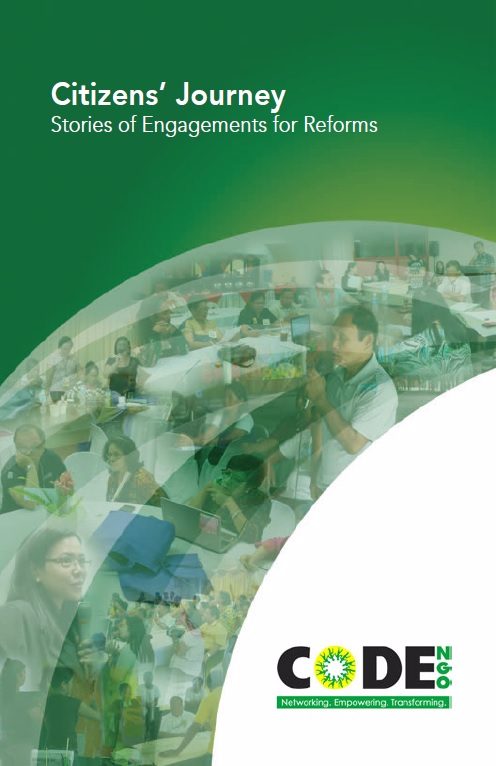SUMMARY
This is AI generated summarization, which may have errors. For context, always refer to the full article.

MANILA, Philippines – Is a book on governance boring? Not at all.
“Citizens Journey: Stories of Engagements for Reforms” is a book containing 11 stories from the engagements of civil society launched by CODE-NGO under its project: Decentralized Governance and Multi-stakeholders Partnership for Regional Development (DG Project).
The Caucus of Development Non-Government Organizations Network (CODE-NGO) complied stories from the experience of project partners working in the Bicol Region, Central Visayas, and in Northern and Southern Mindanao.
The stories provide a preview of local initiatives being undertaken by civil society in its quest for reforms through citizen’s participation in local governance.
The book features stories with varying levels of engagement through partnership and collaboration with the local government and national government agencies working at the regional level.
Civil society
In Bicol, civil society organizations (CSO) share how the use of score cards as performance indicators for implemented projects facilitated efficiency in monitoring. The approach effectively established open communication and feedback between project implementers and stakeholders.
Meanwhile, CSOs in Central Visayas offer lessons on how a good relationship between CSOs and government bodies can make joint efforts and program implementation easier, hence making inclusive development more possible.
The stories from Northern Mindanao explain how a broad joint program implementation involving more than a dozen government entities and various organizations across different sectors can help improve delivery of basic services to target communities. Such approach can also enhance the trust and confidence among participants.
In Southern Mindanao, on the other hand, CSOs provide stories stressing the importance of capacity-building in preparing citizens for effective engagement with the government.
Changing landscapes
Mariefe Del Mundo, project manager of the DG Project, said the stories demonstrate the gradual yet progressively growing participatory governance interventions at the regional, provincial, and barangay levels.
For Del Mundo, these stories could help readers realize the efforts being done by citizens-led organizations at the local level. The book could explain how such efforts slowly transform the landscape as far as local governance and public administration is concerned, she added.
Del Mundo also emphasized that most of the stories reveal the distinct feature of local governance practices across different regions, highlighting the local flavor.
The stories are local and can serve as a model for other CSOs and local governments, according to Dan Ramos, DG Project’s monitoring officer..
The organizations who contributed stories to the book are: Malayang Kababaihan ng Irosin of Irosin, Sorsogon; Camarines Sur CSOs Network for Development, Bohol Alliance of NGOs, Kaabag sa Sugbo, Negros Oriental Network of NGOs, Balay Mindanaw Foundation, Inc., and the Mindanao Coalition of Development NGO Network.
Sixto Donato C. Macasaet, executive director of CODE-NGO said the stories also offer a glimpse into the efforts and accomplishments of CSOs. – Rappler.com
The DG Project helps regional CSO networks to clarify their regional development agenda and to strengthen their advocacies. It is supported by MISEREOR, the German Catholic Bishops’ Organization for Development Cooperation.
Add a comment
How does this make you feel?
There are no comments yet. Add your comment to start the conversation.